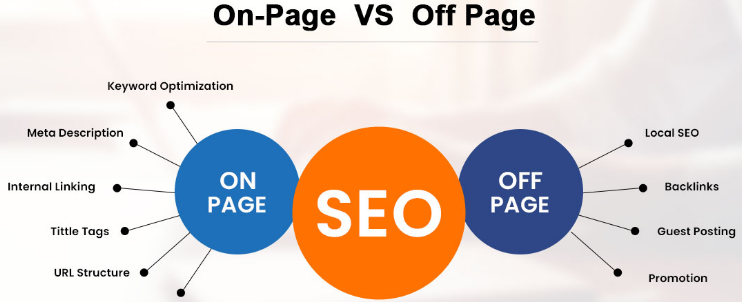In the world of digital marketing, Search Engine Optimization (SEO) is crucial for improving your website’s visibility and ranking on search engine results pages (SERPs). SEO is broadly categorized into two types: On-Page SEO and Off-Page SEO. Understanding and effectively implementing both can make a significant difference in your online success. Let’s dive into what each entails and how you can optimize your site for both.
What is On-Page SEO?
On-Page SEO refers to the strategies and techniques applied directly on your website to improve its search engine rankings. It involves optimizing various elements on your site to make it more appealing to search engines and users. Here’s what you need to focus on:
-
Keyword Research and Optimization
- Keywords: Identify relevant keywords that your target audience is searching for. Use tools like Google Keyword Planner or SEMrush to find the best keywords for your niche.
- Placement: Integrate these keywords naturally into your content, including titles, headings, meta descriptions, and throughout the text. Avoid keyword stuffing, which can negatively impact readability and SEO.
-
Content Quality
- Value: Create high-quality, engaging, and informative content that provides value to your audience. Content should answer users’ questions and solve their problems.
- Format: Use headings, subheadings, bullet points, and short paragraphs to make your content easily scannable and user-friendly.
-
Meta Tags
- Title Tags: Craft unique and descriptive title tags for each page, including relevant keywords.
- Meta Descriptions: Write compelling meta descriptions that summarize the content of your page and include a call to action.
-
URL Structure
- Simplicity: Ensure your URLs are short, descriptive, and include target keywords. A clean URL structure improves both user experience and search engine indexing.
-
Internal Linking
- Navigation: Use internal links to connect related content on your site. This helps search engines understand the structure of your site and keeps users engaged longer.
-
Mobile Optimization
- Responsiveness: Ensure your website is mobile-friendly and provides a seamless experience on all devices. Google prioritizes mobile-first indexing, so this is crucial for your SEO.
-
Page Speed
- Performance: Optimize your site’s loading speed by compressing images, leveraging browser caching, and minimizing HTTP requests. Faster-loading pages improve user experience and reduce bounce rates.
What is Off-Page SEO?
Off-Page SEO involves strategies that are executed outside of your website to boost its credibility and authority. These tactics help search engines understand how your site is perceived by others. Key aspects of Off-Page SEO include:
-
Backlinks
- Quality Over Quantity: Focus on acquiring high-quality backlinks from reputable and relevant sites. Quality backlinks signal to search engines that your content is valuable and trustworthy.
- Diverse Sources: Aim to get backlinks from a variety of sources, including guest posts, industry forums, and social media profiles.
-
Social Media Engagement
- Visibility: Active engagement on social media platforms can drive traffic to your site and increase brand awareness. Share valuable content, interact with your audience, and encourage social sharing.
-
Online Reviews and Reputation Management
- Credibility: Encourage satisfied customers to leave positive reviews on platforms like Google My Business and Yelp. Address negative reviews professionally to maintain a positive reputation.
-
Influencer Marketing
-
Partnerships:
-
Collaborate with influencers in your industry to reach a broader audience and build credibility. Influencers can drive traffic to your site and generate valuable backlinks.
-
Local SEO
- Local Listings: Optimize your site for local search queries by claiming and updating your Google My Business listing. Ensure consistency in your business name, address, and phone number (NAP) across all local directories.
Conclusion:
Both On-Page and Off-Page SEO are essential for achieving a high ranking on search engines and attracting more visitors to your website. On-Page SEO focuses on optimizing elements within your site, while Off-Page SEO aims to enhance your site’s authority and credibility through external factors. By implementing a balanced approach to both types of SEO, you can improve your website’s visibility, drive more traffic, and ultimately achieve your digital marketing goals. Start optimizing today and watch your search engine rankings rise!



